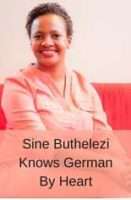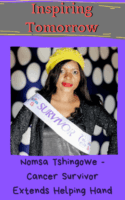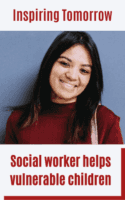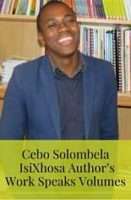Imagine you get lost at the train station of a foreign country and you can’t even speak the language that’s dominant there? To whom would you turn if none of them understood yours? It’s for that reason that Sinenhlanhla Buthelezi (28) saw that learning German was her only option after arriving to live in Germany for a year. And it’s one of the triggers that led her to becoming someone who believes in the promotion of learning new languages.
“After matric in 2005 I applied for a scholarship to go study in Germany for a year on a ‘Cultural exchange’. You basically go to a family and live with them. Sometimes you’ve two to three families, and I lived with two. You’re expected to integrate yourself into the family and their way of living. You get the opportunity to experience the world in first hand,” she recalls.
However, she does admit that she was sad about leaving – but excited about going. “I had no idea what I was getting myself into and when I got to Germany I realised that people do speak English but German is still dominant. It was difficult in the beginning, but the Afrikaans background that I had helped here and there.”
IsiZulu may have been the language that was rolling off her tongue but German became the one that stole her heart.
“German was the foundation of the Bachelor’s degree that I chose when I came back to South Africa. I decided to do Bachelor of Social Sciences with German Studies, Marketing and Media as my majors. I completed that course in 2009 and graduated in 2010. But I’m still studying ’cos with so much information out there, you should never stop learning.”
Sinenhlanhla was born in KwaZulu-Natal and now lives in Johannesburg where she works for German Goethe Institut as a library administrator. The Goethe-Institut is the cultural institute of the Federal Republic of Germany. She loves working at the Goethe-Institut where she has German, African and South African colleagues. Together they make up a formidable team that focuses on projects that deal with current issues from a German and South African perspective and foster cultural exchange and networks between Germany and South Africa.
“We have more than 159 institutions around the world and fifteen institutions in Sub-Saharan Africa. With my colleague, Brigitte Doellgast, we do many projects, which include which include book and literacy promotion and workshops for publishers in Sub-Saharan Africa. We focus primarly on access to knowledge especially in Africa and the digitalization of information and what this means for libraries. We have also partnered with WikiAfrica and have great projects planned for the year,” she adds.
“One of our projects m-literacy brought together mobile literacy projects such as FunDza and Nal’ibali, to name just a few, and we aim to put together a manual on how to educate library staff so they may impart that same info to their readers. People don’t have well-equipped libraries, but they have smartphones and that’s why we ensure that they are enlightened about this powerful device.”
Having been brought up in a family that prioritises education, it’s no wonder she says reading has always been part of her life.
“My parents were both teachers and part of my life was spent with my grandparents because they worked far away from home. Our parents moved us to boarding schools as a way of enabling us to have a better future. It was important then [as it is now] for black children to learn how to speak English.”
She says boarding school exposed her to diversity and that has shaped her character, plus being brought up alongside three other siblings.
“Friends are all you have there. I lived with children from all walks of life and different backgrounds and that always had an influence on the kind of life I lived. I’ve always been a community sort of person and I always enjoyed being around people and helping them,” she adds.
Sinenhlanhla displayed good leadership skills at a young age and she’s still reaping the benefits of that. “I was part of the debating team. Sometimes we’d go to help out with community work, for example to assist with soup kitchens. I was elected as a deputy head girl and that has really helped me in becoming the person I am.”
She believes parents shouldn’t live their dreams through their children.
“We [siblings] are all doing different things. Our parents are very strict but open-minded; they allowed us to take whatever career paths we wanted to. I think it’s okay to let your children make mistakes ’cos that’s another part of learning. Do what’s important to you. It’s hard for my parents to really understand what is it that I do, but they support me nevertheless.”
However, one thing her parents understand fully is that German is not so much of a ‘foreign language’ to her.
“I speak German fluently and so I’m able to understand the culture a little better. Language opens up the world for you and you understand better who people really are and their behaviours. Once you start to learn and understand other cultures you get to learn that no language or culture is better than the other,” she affirms.
However, she maintains that learning a new language doesn’t mean you abandon your mother tongue. “We may be modernised but the same way you speak to your parents is the way you should speak to other parents or other elders as well. There’s a general rule at home that we speak only IsiZulu as a sign of respect to our parents. Learn a new culture without turning your back on your own, and where you come from.”
“It’s important, especially when you are still discovering yourself and where you want to head to in life. You might want to speak English when you’re in a board meeting but shift to a vernacular when you’re addressing people at a ceremony. I strongly believe that languages are so strongly tied with who you’re. It defines you: how you act and behave,” she adds.
Sinenhlanhla, which loosely translates to ‘We’re fortunate’, was lucky enough to learn the language in the best way possible. “It’s different when you learn a language in the country where it originated. Everyone speaks that language and you learn faster. But what was funny is that I attended German classes with children who were in the fifth grade. Because I was still learning the basics I had to attend lower grades for German studies and yet the thirteenth grade for English classes. The children [in German classes] would ask each other, ‘But she’s so much older, why is she here?’” Sinenhlanhla says, putting on the little and soft childish voices, teasingly. She also still has contact with her host families and it is through German that she has been able to build long lasting friendships with people from across the world.
Talking about children, she says she’d love to venture solely into the literacy sector so she can get young children reading and discovering that, “What the mind can believe, it can achieve.”
That is why she has also decided to run her first marathon in aid of collecting books by African authors to sponsor to a school library that does not have these. For every kilometer that she runs she will ask people to sponsor a book with the hope of collecting 42 books.
“We never really know what we’re capable of until someone shows us. It takes one spark to burn down the veldt, but in this case it takes one compliment to revive someone’s confidence. Believe in yourself and you’re already ten steps ahead of others. Go learn a new language and have something that’ll make you stand out from the rest,” she advises people hoping to try new things in their lives.
She concludes the interview by quoting her favourite famous and inspirational quote, by Marianne Williamson:
Our deepest fear is not that we are inadequate. Our deepest fear is that we are powerful beyond measure. It is our light, not our darkness that most frightens us. We ask ourselves, Who am I to be brilliant, gorgeous, talented, and fabulous? Actually, who are you not to be? You are a child of God. Your playing small does not serve the world. There is nothing enlightened about shrinking so that other people will not feel insecure around you. We are all meant to shine, as children do. We were born to make manifest the glory of God that is within us. It is not just in some of us; it is in everyone and as we let our own light shine, we unconsciously give others permission to do the same. As we are liberated from our own fear, our presence automatically liberates others.







